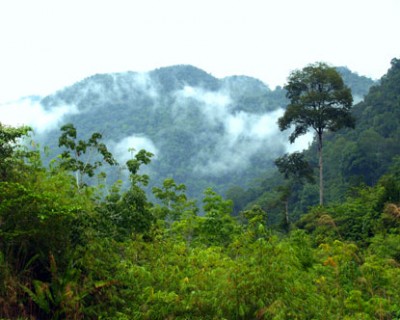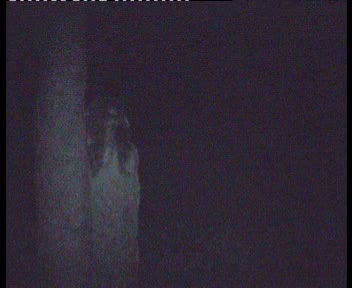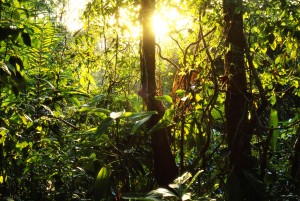A seasoned fieldworker’s reminisicing her first fieldwork in the jungle alone.

The day my first boss hired me, I knew she wasn’t entirely impressed with me. I had wanted to do fieldwork, and back then I hadn’t exactly inspired any confidence as a possible long-term fieldworker. I looked too soft, too mild.
And yet, she had hired me on the strength of my reference, Kathy MacKinnon, a close friend of hers. Within the conservation circle that apparently is a big deal. I met MacKinnon at the World Bank, through my mentor at that time, when I was interning at the Smithsonian Natural History Museum, in Washington D.C. MacKinnon was impressed by my earnestness to return to Malaysia and work in conservation, but admittedly knew nothing of my fieldwork skills whatsoever (there weren’t any then).
Despite her misgivings, my boss soon dispatched me to my first long-term assignment, to conduct diurnal primate fieldwork at Samunsam Wildlife Sanctuary, Sarawak. I was to collect primate data via line transect, and boat surveys for a year.
Before I left for the field, my boss sat me down and told me about when she first arrived in Sarawak from the United Kingdom, and carried out fieldwork in Samunsam: she hauled a 20 horsepower boat engine by herself, learnt how to maneuver a tiny boat through crocodile-infested swamps, and built a camp with her bare hands.
“Can you do all this too,” said she, with a very straight face.
Feeling extremely overwhelmed, I squeaked an unconvincing yes.
“I think what you need to do at the very least is to camp in the jungle for a couple of days on your own. Perhaps then, we can tell that you’re up to this.”
So relieved that I didn’t have to build a camp with my own bare hands knowing exactly what my carpentry skills are like (there are none), I eagerly took up the challenge.
__________
I had been arguing with Pak Man, the boat driver for Samunsam Wildlife Sanctuary for at least an hour.
“This can’t be right. She can’t be serious about sending you off on your own. It was fine for her, she is orang putih, and she’s big-sized, so she can take care of herself, but you are not. Do you know how dangerous it is to be by yourself? It’s not just the pontianak, but also there are many illegal hunters roaming around. You’re only a young girl. Who knows what they would do to you when they find out that you are by yourself. You’d be several hours away from help, and once I drop you off at the camp, there is no way of you getting back here on your own. Did I mention about the pontianak?”
There were two things I was certain at that time. There was no such thing as the pontianak, and even if there was, I was more terrified of my boss than any pontianak out there.

“Pak, she was so dead serious. And I need to do this; it’s my job on the line. I’d be fine, I’ve got my parang, you will pick me up in a couple of days, I can continue on with my fieldwork and everybody will be happy.”
We argued back and forth, until he gave up and agreed to drop me off at the camp.
It was possibly the longest couple of hours of my life, going by boat through the swamps of Samunsam. I distracted myself by counting the number of individuals of each proboscis monkey group we came across. I grew increasingly nervous when we reached camp and it was dark from the thick peat undergrowth. I could barely make out the short pier until Pak pointed it out to me.
“Are you sure you want to do this. You can come back with me right now, and we’d make up a story for your boss about how you did it. No one will ever know the truth.”
“But Pak, I would know, and it matters to me.”
He shrugged and dropped me off at the pier.
“Follow the path, and it would take you to the hut your boss built. No one has lived in it for years and it’s run-down but since you’ve got your equipment, I guess you’d be ok. Are you sure you want to do this?”
I thanked Pak for his kindness, and sent him off.
It was only three in the afternoon but because of the thick forest growth, it was already quite dark. As predicted by Pak Man, the hut was extremely run-down. It was an open hut, with three walls, the open face facing a crude table and bench. There was a small stream nearby, where I could take baths, and drinking water. The coucal had started its afternoon calls, and despite its initial appearance, the place was rather cosy.

My nervousness soon broke into self-pride: I was doing this, finally. As a teenager, I had dreams of doing fieldwork but didn’t know whether I could do it and here I was, in my very own camp.
Soon I was making house, having laid my hammock as a campsheet on the hut, sweeping away leaves around the little compound, and getting dinner ready. Despite some nervousness about the growing darkness, I felt that I was at the right place, at the right time. This instinctiveness is something I grew to trust over the years, especially during more hairy situations.
__________
The thing about bravery (or stupidity, I can never tell the difference) is that the fear of doing the unknown never really goes away. But you still do it anyway because it feels like there is no other choice. So there I was, watching the fire that I had built (my very first!) and thinking, “Darn, the fire makes the shadows really creepy.”
I couldn’t help but start thinking of the pontianak that shouldn’t be existing. Having the fire felt like a beacon to all things scary and spooky in the jungle. Logically, I knew the fire should make me feel safe, but it only made me felt isolated.
And so what seemed at the time the most brilliant idea ever, I snuffed out the fire and went to bed. It was a huge mistake, for all the scary sounds and dark shadows that danced around the perimeter of the fire’s warmth, soon swooped around me. I wrapped myself tightly inside the sleeping bag, and counted the hours before daybreak. It was only seven in the evening.

It was going to be a very long night.
I cannot remember whether I slept at all that night, but I remember all the groaning, grunting, whispering around me. The hut was elevated, and so there was strange noises from below me as well.
The biologist in me told me that it must be wild pigs, yet the Catholic in me was freaking out, thinking of all sort of unholy things.
I don’t think I have said that many Hail Marys, and Our Fathers in one night ever again, interspersed with swearing, and taking the Lord’s name in vain (sorry, mom).
__________
The morning sun finally streamed through the pockets of the canopy. A family of gibbons was calling out to each other, and I, budding fieldworker, had survived my first night. I couldn’t be more proud of myself.
The rest of the day was spent in a heady gaze. I discovered a couple of trails leading away from the camp, and explored them. I swam in the stream. I looked for prints and signs of wild boar around the camp because I certainly heard them the night before. And there were none.
I had two choices: I could believe that what I heard that night was likely of the supernatural, or I could believe that there was a logical earthly explanation that I didn’t know of yet. Naturally, I chose the latter.
The second night was like the previous night for all its unnerving groans and sighs, but this time, I had kept the fire burning. I was a lot more relaxed, for I had felt that if anything would have happened to me, it would be so on the first night.
I woke up on the second morning, triumphant and more refreshed. Pak Man was due to pick me up in a couple of hours, and so I spent the morning packing.
When he arrived at the pier, he looked rather stunned.
“Oh, you’re ok,” he said, with a tinge of disappointment in his voice.
“Yes,” I said happily, as I clambered into the boat, “I had the best time ever.”

As we headed for the long ride back to the Park headquarters, Pak explained to me over the roar of the boat engine:
“I can’t believe that you did it. And you survived. You are the first person (and just a girl!) after your boss to stay at the camp on your own. And that must be over 10 years ago. Many of our staff refused to stay there even in groups. They talk about seeing a pontianak that roams the area. Those who have stayed in that camp have gotten really sick for no reason, and refuse to go back. Are you sure you are ok?”
“I’m really ok, Pak. And I can’t wait to go back and tell my boss.”
__________
Back in the office, I told my boss that I had did it, I had done what she had requested.
“Oh,” she said rather distractedly, “I didn’t think you would do it. It wouldn’t have mattered anyway even if you didn’t do it.”
Rather deflated, I told my colleague (who in all appearances looked more buff, and fieldworker-worldly than I would ever be) what I had done, and she was horrified. She explained to me that she would have never done it herself, that it was a stupid and dangerous thing to do: to stay in the jungle all by myself for several nights, without any way of getting help when I needed it.
“I’ve heard about the pontianak and I don’t know how much that is true but there are a lot of illegal hunters that shouldn’t be there, and who knows what they would do to you.”
Word soon got around the Forest Department where my office was based what I had done, and there were similar horrified reactions. My boss soon called me in, to sheepishly tell me, to not do it again. I would be based in the park headquarters, instead of the camp, for the rest of my fieldwork period.
I was rather disappointed because I had psyched myself up for living long-term in the camp. However, as I soon discovered, despite having to spend nights at the park quarters, I still managed to do a lot of fieldwork on my own (budget was tight for hiring field assistants), and that lone fieldwork experience was one of the purest joys I’ve ever had.
And yes, I did have more hairy experiences of bumping into illegal hunters with guns while being hours and several kilometers away from the nearest help. But that is a story for another time.
June is a Malaysian conservationist from Sarawak, where she was born and raised. She is of Krokong-Bringing (Dayak Bidayuh) and Filipino (Tagalog) descent and now seeks peace and acceptance in the Philippines. She tweets @j_rubis

Jungles always gives me goosebumps especially at night. You are a really brave person.
Yeah i am also afraid from the forests in night and evening time. They actually have a big courage to go there at these times.
I guessed NS trainees are more than willing to be fielded here minus all the bewildered army officer cum instructors.
This is the kind of experience all youth should endeavored for.
Another golden shower piece. THANKS.
Ka Ea – we can go camping anytime!
Lyon – yes, I agree even when walking during the day, it can be spooky. Notice that some parts of the jungle gives you stranger vibes than others! I actually did have a ghostly encounter in the jungle. Maybe will write about it one day.
Dear June,
It indeed was an interesting article. I have in the past jungle- trekked to climb mountains in the peninsula and have often been alone for a while (in daylight of cource) – the guides and rest of the team were either ahead or at the rear. Beilive me, even during the day in the jungle, when one is alone, one will hear all types of sounds.
I do not know if I have the courage to spend nights alone away from civilisation.
Kudos to you, you are one brave soul.Keep sharing your interesting life.
Shalom
No Pontianaks?
June, can you take me camping?
You're one gutsy lady, I tell ya.